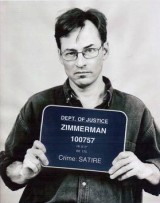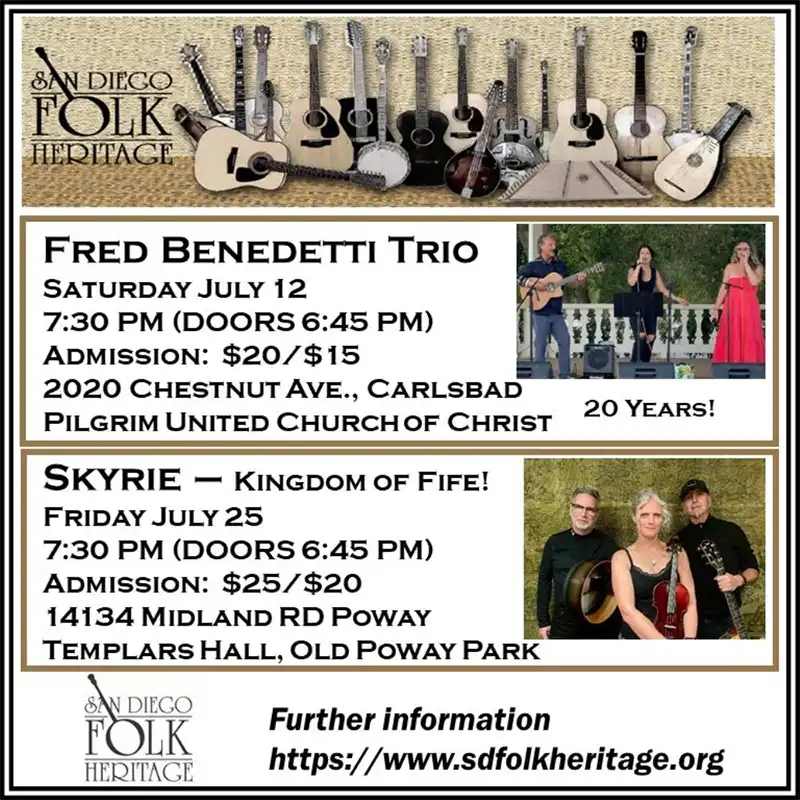Featured Stories
Roy Zimmerman: Songs from the Left for the Right

Roy Zimmerman
Political comedy in song is a rare thing. While there is an overload of political satirists, especially among stand-up comedians, it’s hard to find talented singer-songwriters who devote themselves to comedy. Then again, there are many politically driven topical songwriters out there around the folk-circuit. While they do some funny songs, there usually is also a serious undertow that eventually takes over. With Roy Zimmerman, there is that rare artist who is pure comedian and pure singer-songwriter. He’s biased, of course. He makes no secret of his preference for the left and his dislike of the right-wing and the Republican party has it stands today. But, in the conversation that follows, he also reveals himself to be an insightful, intelligent and often, kind comedian, who leaves no stone un-turned in finding the funny, the absurd and silly in the political scene today.
San Diego Troubadour: Why are there no really good conservative comedy performers like you?
Roy Zimmerman: So much of the message is based on fear and there’s not much that’s funny about fear.
I will mention Ray Stevens. He’s a Tea Party guy now and he’s writing funny songs. They’re kind of passively racist. I will say they are funny because he’s a good songwriter. We used to have a name for right-wing satire. We called it cruelty because that’s so often the mode of operation they’re in.
SDT: It seems the best they have to offer is Rush Limbaugh.
RZ: Yeah, he considers himself a comedian anyway. This whole story he just offered up about the now incredibly unfortunate thing about Batman and the reference to Bain. He knows it’s stupid. but he also knows his listeners don’t know that. So theres a cynism that goes along with the cruelty. He’s not afraid to lie. What’s more important is getting his message over and getting a laugh. I do see cynicism in left-wing satire but at least the heart is in the right place.
SDT: How is the current event comedy out there compared with the past?
RZ: People say satire must be easy. There’s plenty of comedy out there. But in my mind it gets harder the more absurd it gets. You have Ann Romney out there saying, “Let’s unzip Mitt and let the real Mitt out and you’ll see he isn’t stiff.” How do you write anything funnier than that!?
SDT: So you really just have to present it.
RZ: Yeah. You see this on “The Daily Show” all the time. They’ll just show the clip and respond with an arched eyebrow and that’s the joke.
SDT: Do you ever play for Republicans?
RZ: Yeah, I do every once in a while. I’ll play general audiences every once in a while. The reaction I get is, “I disagree with everything you say but I laughed.” I like hearing that. Sometimes I’ll get someone who wants to talk about the issues. That’s great. It means the song touched them. Once I was opening for Kenny Loggins. His audience can be anywhere on the political spectrum, really. I said about the Dick Cheney quail shooting incident that he was just exercising his second amendment right to free speech. You get the joke. I had somebody come up to me afterward and say, “hey that’s the FIRST amendment.” He got it.
SDT: So you hope to wake the audience up. Is that what this kind of comedy is meant to do?
RZ: Yeah, that’s what satire is meant to do. I try to infuse the song with some purpose and analysis. So, you see that something is wrong and the song describes why it’s wrong.
SDT: Are you familiar with the story about Dylan and Phil Ochs where Dylan said he wasn’t a songwriter, but a reporter?
RZ: If you can make the news meter and rhyme, then you’re a songwriter. Dylan was trying to touch people on a different level. So was Phil later on. He started writing about more than social issues later on.
SDT: Is there a tendency to trivialize the satirical song? You are a good songwriter and I’d think you need to be to make this work.
RZ: Yeah, I take pride in that. I want the songs I write to be musically satisfying to those who are listening. But, as you imply, not everybody listens to a comedy song for that. Some are just looking for a good joke. It’s not enough for me to write a song like that. I’m not satisfied to perform songs that are too simplistic.
SDT: Is there a difference between comedy and humor?
RZ: I come from a comedy background. When people say humorist it sounds a little stuffy to me. I’d rather be known as a comedian.
SDT: Who is the greatest single artist to you in the arena of musical political satire?
RZ: I’d have to point to Tom Lehrer. He didn’t write that many songs over his short career in public performances. But, they’ve endured. He was able to condense a funny idea in a two- or three-minute song, which have become timeless. But I’d be loathe to say him alone because I think Bruce Springsteen can be funny. Woody Guthrie was funny for his left-wing rabble-rousing.
SDT: There was Randy Newman’s “Political Science.”
RZ: Irving Berlin for his cleverness could be political as well.
SDT: Take a current event like the shooting in Colorado — how do you deal with a thing like this in your show?
RZ: Certain subjects that are tough to approach. Today there are so many easy puns people get into which are really stomach turning. My take would be not the incident but the politics surrounding it. You know, a crazy loner creates a fear of going to the movies, going out in public. There’s this zeitgeist of fear, which so exploited by the right wing. If I were to take a political stance on that, that’s what I’d go with. There’s certainly nothing funny about the actual tragedy. I played Tucson about a month after the shootings there. I knew the gig was coming up and I knew I wanted to have a song about it. There’s a song called “To the Victims of this Tragedy We Send Our Thoughts and Prayers.” It had much more to do with the violent rhetoric that was being put out by Sarah Palin and Rush Limbaugh. Again, that’s about the rhetoric rather than about the incident itself.
SDT: Do you believe that even in the aftermath of something like this, it can be remedied with comedy?
RZ: Sometimes a distraction is the best way to go. You take something that’s so raw. I’ve seen famous comics try to take on some things like this and fall on their face. There’s the story about Lenny Bruce after Kennedy was assassinated. He was booked to play New York City that week. They say he paced around the room for a minute, which is a long time not to say anything. Then, he finally came to the microphone and said, “Phew, Vaughn Meader is screwed!” (Vaughn Meader was the Kennedy impersonator at the time.) Again that’s not about the event at all. It’s about show business. It was tragic because it turned out to be true.
SDT: Do you ever get to meet the subjects of your songs?
RZ: I have. I did a song about Ollie North way back when. A song called “Ollie Ollie Off Scott Free.” It was on a radio show. He still does a radio show from Maryland. He had my group go on to do that song. He thought it was a complimentary song, I think. I’m not sure why he had us on. It was creepy meeting him face to face. He announced us saying, “Friends, this is a weird group.” Friends [laughs]. Everybody’s friends! That’s as close as I’ve come to a confrontation with the face of evil. I would love to do a show for the CPAC convention or Liberty University. I would love it.
SDT: You know that story about Ted Kennedy back in the ’80s. Jerry Falwell’s university accidently sent him an invitation to their graduation and he accepted. When he came they had to roll out the red carpet and be human and civil to him. It’s interesting how when we have to meet each other face to face how things tend to change a bit.
RZ: Especially if you’re a skilled politician, in a good sense, and you’re used to working with both sides of human nature as Kennedy was. A lot of republicans are too. They’re the doomed ones. You know, the Republican party that believed in compromise. Remember them? But, yeah, that’s the thing — you get into a room and realize you’re all human.
SDT: There seems to be an inability to do that in Washington right now.
RZ: Yeah, well, the Tea Party! I take issue with my fellow satirists who portray them as dumb. They are extremely smart. And the smartest thing they did was to take over the Republican party. They didn’t try to start some third party. Instead they infiltrated. We occupy-minded people can take a huge lesson from that. Attach yourself to a power structure. A lot of people say, “We have a corrupt system, that there’s no difference between the Republicans and the Democrats.” Attach yourself to the Democrats and then make a difference and make the parties different. Recognize the two beasts in the ring are the Republican and Democrat beasts and nothing’s gonna happen at a sideshow.
SDT: What your prediction for the presidential race?
RZ: I’m hoping Romney hangs in there at this point. I’m starting to feel sorry for the guy. Almost as if he was human. It’s cute how they anthropomorphize him. I hope he hangs in there because to the degree this election will be a mandate of any kind when Barack Obama beats Romney, it’s a mandate to do something to do something about the one percenters and the people like him who created this ridiculous imbalance in the first place. He’s the guy I want to beat. I think Obama can beat anybody like if Chris Christie jumps in the race. I’d love to get into the inside baseball of who might and who might not. But, its really — like Romney says — a clash of visions of the kind of America you want to live in. Whenever he says that I always think “yeah!” I don’t want to live in 1956.
SDT: Why do you think Obama hasn’t taken the change as far as we hoped he would?
RZ: Because that’s never who he was in the first place. We hoped he would do that. We painted that on him. We pinned so many hopes on him he had to deflate. We painted a progressive president on him. We can’t have a progressive president unless there’s a progressive movement behind him forcing him to do the right things. Roosevelt and the New Deal didn’t come from a dream. There were people who brought that to him and then forced him to do it. They went out and got popular support. I think that’s what has to happen during the second term of Barrack Obama.
SDT: Like Lyndon Johnson and the Civil Rights Movement.
RZ: Exactly the same. He was open to it. But, he was about how to get things done and win. That’s the way Obama has to do it. And win against people who are not going to give it to you. In the way you win at a chess game where you’re six moves ahead and there’s nothing the other person can do about it.
SDT Well, thank you. This has been a good talk. I think I’ve learned some stuff!
RZ: Thank you.
See Roy Zimmerman on Wednesday, August 8 at 7pm. First Church of the Brethren, 3850 Westgate Place, San Diego 92105. Tickets and information: www.prcsd.org/roy.html or call 619.263.9301.






